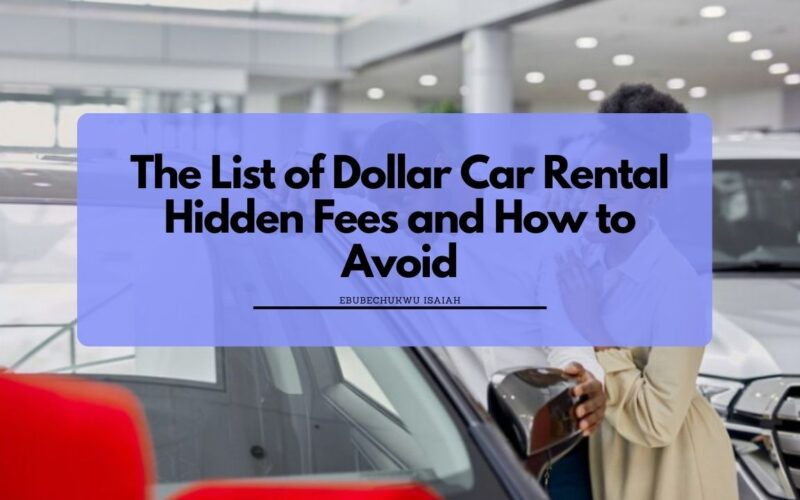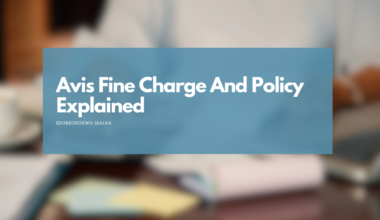As an Amazon Associate, I earn a small commission from qualifying purchases. Learn more about this.
Everyone loves saving money, especially when it comes to renting a car.
But Dollar Car Rental, like many others, has hidden fees that could catch you by surprise.
In this guide, we’ll identify these sneaky charges and share tips on how to dodge them, ensuring your wallet stays as full as possible.
15 Dollar Car Rental Hidden Fees
Airport Related Charges:

- Airport Concession Fees: These charges are fees paid by the rental company for the right to operate at the airport, hotel, or train station. They are often passed on to the customer as Airport Concession Recovery Fees, Airport Concession Fee Recovery & Airport Access Fee, Hotel and Airport Concession Fee Recovery, or similar terms.
- Airport Security Fee: Airports require all car rental companies to collect this fee, which is used to cover the costs of additional airport security.
- Customer Facility Charges: These are fees collected by airports from rental car companies, which are then used to pay for car rental facilities. They may appear on your bill as Austin Bergstrom International Airport (ABIA) Charge, Customer Facility Charge, Consolidated Facility Fee, Facility and Operation Fee, Rental Car Facility Fee, Facility Use Fee, or Facility Maintenance Charge.
How to Avoid:
- Off-Airport Rentals: Consider renting from a location away from the airport. Off-airport rental locations often have lower fees. A quick taxi or rideshare to a nearby rental agency could save you a notable amount.
- Compare Fees: Different rental companies may have varying airport concession fees. Before booking, compare the fees charged by different companies at the airport to find the most favorable rate.
- Check for Bundled Deals: Sometimes, travel packages may include car rentals with negotiated rates that have lower or waived airport fees. Look for such deals especially when booking flights and hotels.
Additional Surcharge:
The “Additional Surcharge” is a fee that is often applied to car rentals in certain states.
This fee is essentially a tax imposed by some states on rental car companies, which is then typically passed on to the customer.
The nature and amount of this surcharge can vary from one state to another.
For example, in the state of Alabama, an additional surcharge is applied to all car rentals.
It’s a way for the state to generate revenue from car rentals. The surcharge is usually a fixed amount or a percentage of the rental cost. It’s important for renters to be aware of this fee as it increases the total cost of renting a car.
Lastly, keep in mind, this fee is not optional and must be paid by all customers who rent a car in states where the surcharge is applied
Tourism Fee:
- Tourism Surcharge: This fee is imposed by some states like Connecticut on all car rentals of 30 days or less to support various state projects.
- CA Tourism Fee: This fee covers the monthly charges all car rental companies are required to pay to the California Travel and Tourism Commission on revenue generated at airport or hotel rental locations.
Energy Surcharge:

The “Energy Surcharge” is a fee that some car rental companies may apply to cover various energy-related expenses.
This could include costs related to fueling the rental vehicles, utility charges at the rental facility, or even costs associated with the disposal of oil and other automotive fluids.
The energy surcharge is essentially a way for the rental company to offset some of the costs related to energy consumption.
It’s an additional fee on top of the rental price and other charges.
The amount of the energy surcharge can vary and it’s often not a reflection of the actual energy costs incurred during the specific rental transaction.
It’s a predetermined fee that is applied to all rentals, regardless of the duration or distance driven.
Toll Fees:
Toll fees are charges incurred when a rental vehicle passes through toll booths on toll roads, bridges, or tunnels.
When you rent a car, the responsibility for paying these tolls falls on you as the driver.
However, some rental companies offer electronic toll payment systems that automatically pay the tolls, making it convenient for the renter.
The downside is that rental companies may charge an additional administrative fee for this service on top of the actual toll costs.
These fees can add up quickly, especially in regions with numerous toll roads.
It’s advisable for renters to inquire about the rental company’s toll payment policies and fees before starting their trip.
If possible, you may opt to use cash or your own toll payment account to avoid the additional charges imposed by the rental company for their electronic toll payment service.
State Fees:
- Allegheny County Rental Tax: A fee required by the County of Allegheny for all car rentals, with the collected money remitted to the county.
- Maricopa County/Arena Fee: Maricopa County, Arizona requires all rental car companies to collect a Short-Term Motor Vehicle Rental Surcharge.
- Colorado Road Safety Program Fee: This fee is imposed by the State of Colorado to enhance the safety of state, county, and municipal roads.
Underage Charge:
The “Underage Charge” at Dollar Car Rental is a fee applied to renters who are under the age of 25.
The minimum age to rent a vehicle with Dollar is 20 years old throughout the U.S. and Canada, and 18 years old in New York and Michigan1.
The specifics of the underage charge may vary, but it is a common practice in the car rental industry to charge younger drivers extra due to the perceived higher risk associated with their inexperience on the road.
In certain locations like New York, Michigan, and the Province of Quebec, an “Age Differential Charge” is applied to renters aged 18 to 24.
For instance, in New York and Quebec, renters aged 18 to 19 may rent certain car classes at a rate of $52.00 per day2.
Unfortunately, the exact details on the amount charged as the “Underage Charge” by Dollar Car Rental, and how it’s structured, are not publicly available.
It’s advisable to check with Dollar Car Rental directly for the most accurate and current information regarding their underage charge policy.
Additional Charges:
- Late Return Fees: If vehicles are returned late, additional charges may apply. For instance, vehicles returned 30 minutes late or more may incur charges for an additional part or full day.
- Motor Vehicle Lessor Tax: Some cities require all car rental companies to collect a tax per rental.
- Parking Fine Recovery Fee: In some states like Massachusetts, car rental companies are required to collect this fee to offset the cost of unpaid parking tickets by car rental customers.







